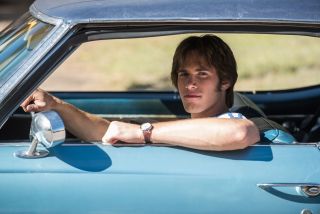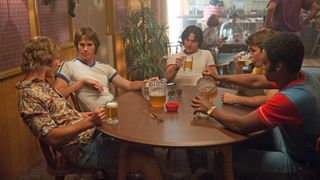“Music and smells – they’re the most nostalgia-inducing things.” So says Richard Linklater, director of celebrated indie movies such as Boyhood, Slackers, School of Rock, Dazed and Confused, and now Everybody Wants Some!!, a college comedy named after the Van Halen song of the same name (hence the two – count ‘em!! – exclamation marks). “Smells and music take people back to a very specific memory. A smell can take me back into my grandmother’s living room when I was a kid, a song comes on the radio and you’re back at that party when you were 16.”
Sadly, or perhaps fortunately, smell-o-vision has still yet to make it to our cinemas, so that leaves music as the most effective way for filmmakers to effectively transport us back into a particular place and time. In the case of Everybody Wants Some!!, that time is August 1980, and the place is a college in Texas, where we meet Jake (Blake Jenner), a freshman on a baseball scholarship, en route to meet his new housemates, and indeed teammates, for one long, raucous weekend of irresponsibility before term starts.
You know from the moment the opening scene focuses on a Pioneer cassette deck in Jake’s car, and The Knack’s New Wave classic My Sharona comes blasting out, that music is going to play more than just a cameo role in this movie.
“Yeah, that’s an underdash tape-deck,” Linklater smirks, reliving his own youth from a sofa in a Soho hotel room. “They were easy to steal, so that would have ended up gone in a week or two!”
The more we talk to Linklater, the more it becomes clear that Jake bears more than a passing resemblance (allowing for the frankly impossible handsomeness of Jenner and the rest of the cast) to the writer and director.
Like Jake, Linklater went to college on a baseball scholarship, taking his rapidly growing music collection with him.
“Yeah,” he says, “I was the guy who went off to college with his whole stereo system, all my LPs and cassettes. My car was worthless, but my net worth was in my stereo.”

That forming of individual identities is a key theme in the movie as Jake has his eye on a cute performing arts student Beverly (Zoey Deutch) in the sorority house across town, which draws him into a different world from the ‘jocks’ on the baseball team. Naturally, the baseball boys tag along to Beverly’s house party anyway, and their encounter with the freaks and fruitcakes there makes for a highly amusing final act of the movie.
“I was drawn to the performing arts people and ended up on a playwriting course,” Linklater recalls. “My two worlds collided so I didn’t really want them at that party. But they came nonetheless!”
At the time depicted in the movie, Linklater was a fan of rock, new wave and punk, and you sense that his affection is still strongest for guitar music. Nonetheless, he insists, “every song in this movie I have a very personal relationship with,” and since the soundtrack encompasses everything from disco to punk to country and hip-hop, you can see how he’s keen to reflect all the different genres that were hitting an artistic and commercial peak at the turn of the Eighties.
40 songs eventually made it onto the movie’s soundtrack in some form or other, chosen from a shortlist Linklater drew up in the early stages of writing the movie. He even gave the actors a listening list to familiarise them with the sounds that dominated the era they were about to immerse themselves in. And not just the obvious stuff either. For every My Sharona there’s a less obvious track like Sniff N’ The Tears’ one-hit wonder Driver’s Seat, or The Bus Boys’ curious punk-funk gem Minimum Wage. Even the woollier fare of the early Seventies is down to represent, with one memorable scene featuring a stoner housemate explaining the secrets of the universe with the help of a giant bong and Pink Floyd’s Fearless.
“Oh wow, yeah, that was fun,” says Linklater. “People deciphering a song, reading into it what it REALLY meant. Everyone loved to do that around that time. And it could be anything. Often it was about the supposed, secret raunchiness of a song – ‘Hey, did you know Devo’s Whip It is really about S&M?!’ Or something mind-blowingly esoteric that seemed to fit when you were getting high. So that’s what that scene’s about. A campfire of a different kind!”
Hang on, though, this is 1980. Aren’t we usually told by the official version of rock history that punk had destroyed hippy ‘dinosaurs’ like Floyd by that point?
“People say punk killed all that stuff, but in reality it hung in there,” he says. “That’s what was cool about that time – you could like it all. Personally, I could find a place for it. Disco you couldn’t admit to liking, but it was still there on the radio. Country wasn’t really my kind of music but it was really blowing up, because the film Urban Cowboy had just come out so it was kind of hip, and I was in the south, so you were exposed to it a lot, and like in the movie, you’d end up in these clubs sometimes and have a pretty wild time. I identified with new wave and punk, but where do you put the art rock like Frank Zappa, Captain Beefheart, King Crimson? Tull? All that stuff still sounded cool to me.
“And a lot of this music was very successful. They sold a lot of albums in all these different genres. You see what you thought was a fairly minor act, then you look at the figures and go, ‘oh my god, that band sold seven million albums?!’ They just had room for all that because it sold so much.”
Meanwhile, almost without many people actually taking it seriously, the hip-hop revolution was already under way, something reflected in the cast’s word-for-word rendition of The Sugarhill Gang’s Rapper’s Delight. Not that many people felt much of any significance was afoot at the time. “Yeah, rap music just felt like a novelty thing at the time – you expected it had about an 18-month lifespan, you know? I think maybe even the rap artists felt like that! I don’t think anyone would have imagined people would grab it and take it to a whole other level.
“But you could dance to Rapper’s Delight, they played it at the discos, so you could see how that and other forms of R’n’B were starting to hijack disco and take it somewhere else.”
One thing that Everybody Wants Some!! captures very effectively is the sense of young adults scrabbling around for an identity. In one scene we see Jake bump into an old school friend replete with a Mohawk haircut and a jacket emblazoned with the Anarchy symbol, who takes him to a punk show.
“Yeah, he’s looking the part, yet that guy was on his baseball team a year earlier, right? The great thing about college is that you can reinvent yourself like that. But even though people talk about tribes, and the punks would give off this attitude of hating outsiders, it was actually a pretty welcoming scene.
“That bit in the movie is based on a time I wandered into a punk club when I was in Austin in my freshman year of college. Guys my age were playing in the bands, there would be this crazy moshpit, and and the whole thing had such a great energy and attitude – it was such a fun time.”
And if anyone epitomised the innocent, party-hungry attitude that the movie exudes it’s the band whose song the film is named after – Van Halen.
“Those first few Van Halen albums will always be special. It’s not their fault that the hair metal bands were their progeny. They were the first, they were the original. I loved that title and that song because it can mean a few different things. It’s raunchy but it’s funny, with a certain irony and humour to it. Everybody Wants Some!! – it means being young, wanting everything and expecting everything. Van Halen had that primal party innocence, I always equated them to it, and that’s a lot of what the movie is about.”
Everybody Wants Some!! is in cinemas from today.


